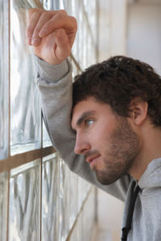
Comprehending Agoraphobia
It is commonly believed that someone who sufferers from agoraphobia has a fear of crowded situations.
Actually, it is a type of anxiety disorder in which the individual fears experiencing a panic attack in general, anywhere. Whether it's at home, at work, in a restaurant or where ever.
Social anxiety disorder (SAD) is frequently mistaken for agoraphobia.
Agoraphobia commonly results in a person avoiding situations such as being alone outside of their home, traveling in a car, bus or airplane or being in a crowded place.
Anywhere that they might experience a panic attack and are unable to receive help would be totally avoided.
It is commonly believed that someone who sufferers from agoraphobia has a fear of crowded situations.
Actually, it is a type of anxiety disorder in which the individual fears experiencing a panic attack in general, anywhere. Whether it's at home, at work, in a restaurant or where ever.
Social anxiety disorder (SAD) is frequently mistaken for agoraphobia.
Agoraphobia commonly results in a person avoiding situations such as being alone outside of their home, traveling in a car, bus or airplane or being in a crowded place.
Anywhere that they might experience a panic attack and are unable to receive help would be totally avoided.

Even though some people with agoraphobia are o.k. with seeing visitors, it has to be in a defined space where they feel that they are in control.
These people may very well live for years without leaving their homes. Gladly welcoming visitors and working, just as long as they don't leave their safety zones.
Is Agoraphobia Very Common?
It is speculated that 3.2 million Americans between the ages of 18 and 54 are living with agoraphobia. Most people develop agoraphobia after the emergence of panic disorder.
The National Institute of Mental Health (NIMH) reports that one out of three people with panic disorder will also develop agoraphobia.
Women are twice as likely as men to develop agoraphobia. This may be explained by social/cultural factors that promote the greater expression of avoidance coping strategies by women. Although other stimuli may also play a part in it.
These people may very well live for years without leaving their homes. Gladly welcoming visitors and working, just as long as they don't leave their safety zones.
Is Agoraphobia Very Common?
It is speculated that 3.2 million Americans between the ages of 18 and 54 are living with agoraphobia. Most people develop agoraphobia after the emergence of panic disorder.
The National Institute of Mental Health (NIMH) reports that one out of three people with panic disorder will also develop agoraphobia.
Women are twice as likely as men to develop agoraphobia. This may be explained by social/cultural factors that promote the greater expression of avoidance coping strategies by women. Although other stimuli may also play a part in it.

What Are The Symptoms?
Individuals with agoraphobia are, as a rule, profoundly hypersensitive to their own bodily perceptions. Subconsciously they over react to everyday events.
For example, the exertion needed to climb a flight of stairs may possibly evolve into an all-out panic attack because it increases their heart rate and breathing becomes rapid. The agoraphobic will interpret this as the launch of a panic attack.
People with agoraphobia become aware of and steer clear of any situations where an attack may be triggered.
Someone with this disorder may have a severe panic attack in any situation where he or she feels trapped, uneasy, not in control or just plain too far from his or her comfort zone.
When the anxiety becomes severe, the person may confine themselves to his or her home. Sometimes the confinement is kept to one or two rooms. They may even become bed-bound until the adrenaline level returns to normal and the over-stimulated nervous system has calmed down.
Individuals with agoraphobia are, as a rule, profoundly hypersensitive to their own bodily perceptions. Subconsciously they over react to everyday events.
For example, the exertion needed to climb a flight of stairs may possibly evolve into an all-out panic attack because it increases their heart rate and breathing becomes rapid. The agoraphobic will interpret this as the launch of a panic attack.
People with agoraphobia become aware of and steer clear of any situations where an attack may be triggered.
Someone with this disorder may have a severe panic attack in any situation where he or she feels trapped, uneasy, not in control or just plain too far from his or her comfort zone.
When the anxiety becomes severe, the person may confine themselves to his or her home. Sometimes the confinement is kept to one or two rooms. They may even become bed-bound until the adrenaline level returns to normal and the over-stimulated nervous system has calmed down.
What Are My Treatment Options?
The treatment options for panic disorder and agoraphobia are similar.
Successful treatment of agoraphobia is plausible for a great deal of people through a very gradual progression of exposure therapy together with cognitive therapy and sometimes anti-anxiety or antidepressant medications.
Cognitive therapy gives you the information that you need to implement change in counter-productive or harmful thought patterns. Thus allowing you to study your feelings and determine how to separate valid thoughts from unrealistic ones.
Much the same as behavior therapy, you are actively involved in your own recovery and establish a sense of control.
Behavior therapy for agoraphobia helps you to take control over unwanted behavior. It also shows you how to cope with difficult situations. Routinely through controlled exposure to them.
Cognitive-Behavior Therapy, or CBT, is a combination of the above two therapeutic strategies. The best part about these types of therapies is that the patient discovers recovery skills that are useful for a lifetime.
Anti-anxiety medications include benzodiazepines such as alprozalam. The antidepressants most often used are SSRIs like paroxetine, fluoxetine and sertraline.
While those are the most commonly used treatment options, others include relaxation techniques, hypnotherapy, neuro-linguistic programming (NLP), and energy psychology.
With the right techniques, agoraphobia can be treated and you can go on to live a productive life. There's no miracle cure for agoraphobia, but there are a few options that will help you discover how to deal with and overcome the fear and anxiety.
I suffered with anxiety and panic attacks for many years. Now I'm on the road to a complete and permanent recovery.
If you or someone you care about suffers from anxiety attacks, do something!
Get your life back.
Do it now!
Learn to manage anxiety and recognizing the anxiety attack for what it is.
Just fear, and that's all it is.
The treatment options for panic disorder and agoraphobia are similar.
Successful treatment of agoraphobia is plausible for a great deal of people through a very gradual progression of exposure therapy together with cognitive therapy and sometimes anti-anxiety or antidepressant medications.
Cognitive therapy gives you the information that you need to implement change in counter-productive or harmful thought patterns. Thus allowing you to study your feelings and determine how to separate valid thoughts from unrealistic ones.
Much the same as behavior therapy, you are actively involved in your own recovery and establish a sense of control.
Behavior therapy for agoraphobia helps you to take control over unwanted behavior. It also shows you how to cope with difficult situations. Routinely through controlled exposure to them.
Cognitive-Behavior Therapy, or CBT, is a combination of the above two therapeutic strategies. The best part about these types of therapies is that the patient discovers recovery skills that are useful for a lifetime.
Anti-anxiety medications include benzodiazepines such as alprozalam. The antidepressants most often used are SSRIs like paroxetine, fluoxetine and sertraline.
While those are the most commonly used treatment options, others include relaxation techniques, hypnotherapy, neuro-linguistic programming (NLP), and energy psychology.
With the right techniques, agoraphobia can be treated and you can go on to live a productive life. There's no miracle cure for agoraphobia, but there are a few options that will help you discover how to deal with and overcome the fear and anxiety.
I suffered with anxiety and panic attacks for many years. Now I'm on the road to a complete and permanent recovery.
If you or someone you care about suffers from anxiety attacks, do something!
Get your life back.
Do it now!
Learn to manage anxiety and recognizing the anxiety attack for what it is.
Just fear, and that's all it is.
 RSS Feed
RSS Feed